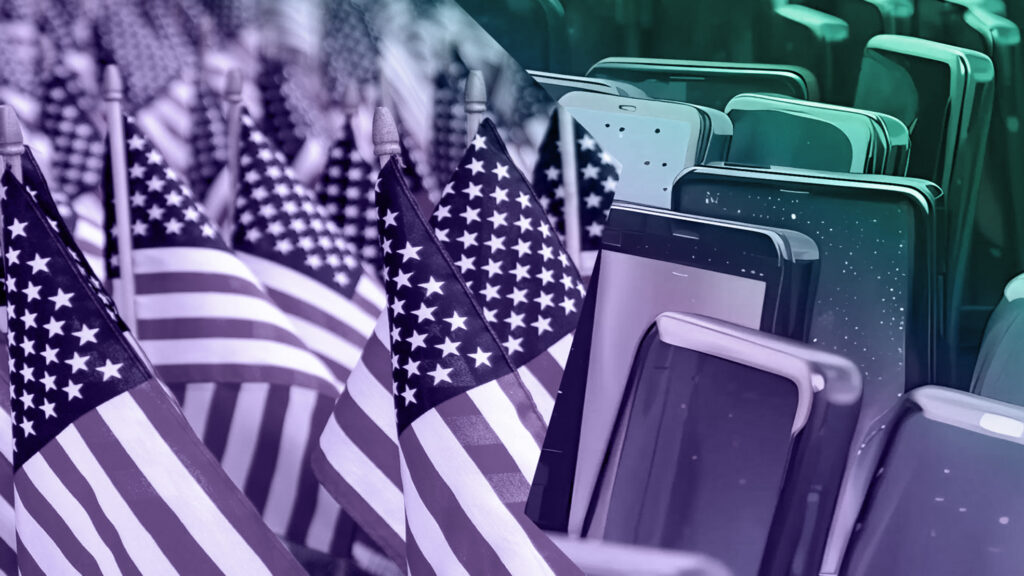March 18, 2024
By Ian Tang, Capstone Tech, Media, and Telecommunications Analyst
The latest effort by Congress to address perceived national security risks posed by Chinese ownership of TikTok barreled through the House of Representatives last week, and the Senate appears ready to have its own deliberations on the measure in the coming days. Beyond the First Amendment and constitutional challenges expected if the bill were eventually signed into law, the congressional action highlights an underappreciated tension: What happens when two bedrock policy objectives conflict and potentially undermine each other?
The proposal’s reliance on private actors who operate the most widely used mobile operating systems—Apple and Google—pits national security and antitrust policies against each other, in addition to bringing tough enforcement challenges, contradictions, and questions.
The congressional action highlights an underappreciated tension: What happens when two bedrock policy objectives conflict and potentially undermine each other?
The Protecting Americans from Foreign Adversary Controlled Applications Act (H.R. 7521) would prohibit any entity from distributing, maintaining, or updating the TikTok mobile app or any other “foreign adversary-controlled application” identified by a president in the future. These restrictions apply explicitly to online mobile application stores and internet hosting services. However, TikTok could continue to function if parent company ByteDance offloads its US assets and terminates any remaining operational relationship with the parent. It attempts to replicate, though in a more convoluted manner, Trump’s 2020 presidential order based on the Committee on Foreign Investment in the US’s (CFIUS) finding that ByteDance’s acquisition of TikTok’s US predecessor presents national security concerns., The order, still in effect, compels that divestiture subject to negotiations between ByteDance and the US.
Federal lawmakers drafted the bill to alleviate prior concerns that a legislative ban would disrupt Americans’ access to the service and infringe on civil liberties. Many have turned to speculate on who may emerge as the potential buyer(s) and how federal antitrust enforcers would scrutinize the competitive effects thereof. Yet, not only has TikTok signaled that a divestiture is unlikely to happen, but the Chinese government all but acknowledged the same in its initial reaction. Consistent with similar messages that the Ministry of Commerce has made in the past, a spokesperson for the agency reiterated its discontent with the US policy objectives and emphasized that ByteDance “should strictly abide by Chinese laws and regulations,” bringing into question what parts of its business ByteDance could sell off. That comment is likely in reference to export controls it promulgated in 2020, which extended its jurisdiction to review transactions involving information processing technologies like personal interactive data algorithms.
By providing a backstop for ByteDance’s potential refusal to divest its US arm, H.R. 7521 inherently recognizes and affirms Apple and Google’s market power in mobile app distribution.
However, herein lies the conundrum. That provision presents some striking tensions with the broader discussion underway over Apple and Google’s control of the distribution of mobile applications, as those two companies face increasing pressure and outright regulation on both sides of the Atlantic to allow third-party developers other avenues to distribute their apps.
Republicans have criticized Apple and Google for blocking, removing, or deplatforming services like Parler, leading to their support for legislation like the Open Apps Market Act (S. 2710). Though US policies on this front are likely to remain much weaker than the European Commission’s Digital Markets Act that is currently coming into force, private litigants like Epic Games and state attorneys general are already making headway at easing barriers for users attempting to “sideload” an app on Android, with likely more remedies to come in those proceedings.
However, the ability to sideload would make it more difficult to carry out an effective ban. If the policy advocacy for “sideloading,” alternative app stores, and progressive web apps were to succeed in the US, those changes would negate the effects of delisting TikTok’s services on the App Store and Play Store because of a ban. Indeed, with 180 days after any bill passage, TikTok even likely has adequate time to pursue changes on how its app is distributed and walk users through these steps, especially given how effective its push notifications encouraging app users to lobby Members of Congress have been. In some ways, the absence of TikTok from the traditional app stores might even raise its profile and popularity amongst the service’s younger demographic, who are less likely deterred by the barriers and warnings to sideloading.
The simultaneous policy developments of leaning on Apple and Google here while finding ways to provide consumers more choice to bypass their pre-installed marketplaces elsewhere will create a fascinating conundrum for policymakers in the years to come. Can they have their cake and eat it too?
To be sure, previous initiatives like the Trump administration’s executive order directing the US Department of Commerce to ban US persons from engaging in transactions involving TikTok based on the information and communications technology and services (ICTS) supply chain emergency, as well as the Restricting the Emergence of Security Threats that Risk Information and Communications Technology (RESTRICT) Act (S. 686), raised similar issues, albeit in a more indirect and narrower fashion. H.R. 7521’s brief language and limited legislative history will leave ambiguities for compliance, while the unique ultimatum and explicit reliance on digital marketplaces could make alternative distribution more mainstream. The simultaneous policy developments of leaning on Apple and Google here while finding ways to provide consumers more choice to bypass their pre-installed marketplaces elsewhere will create a fascinating conundrum for policymakers in the years to come. Can they have their cake and eat it too?
As this scenario plays out, it will both elevate and complicate the ongoing policy debate on the market dominance Apple and Google hold in the mobile ecosystem, especially as future battles are likely to come of other apps affiliated with a foreign adversary gaining traction—dynamics Capstone will be playing close attention to.

Ian Tang, Capstone Tech, Media, and Telecommunications Analyst
Read more from Ian:
Caught in the Middle: Why US-China Competition Holds Underappreciated Risks for Microelectronics and Consumer Goods
The Mounting Fall Tech Congressional Agenda: What’s in, What’s Out
The Underappreciated Persistence of Antitrust Regulators
Read Ian’s bio here.



























